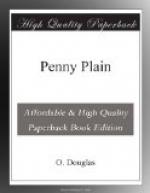and Mhor followed with a poem, “In Time of Pestilence,” which had captivated his strange small boy’s soul, and which he had learned for the occasion. Everyone felt it to be singularly inappropriate, and Miss Watson said it gave her quite a turn to hear the relish with which he knolled out:
“Wit with his wantonness
Tasteth death’s bitterness:
Hell’s executioner
Hath no ears for to hear
What vain art can reply!
I am sick, I must die—
God have mercy on us.”
She regarded him with disapproving eyes as a thoroughly uncomfortable character.
One of the guests sang a drawing-room ballad in which the words “dear heart” seemed to occur with astonishing frequency. Then the entertainment took a distinctly lower turn.
David and Jock sang a song composed by themselves and set to a hymn tune, a somewhat ribald production. Mhor then volunteered the information that Mrs. M’Cosh could sing a song. Mrs. M’Cosh said, “Awa wi’ ye, laddie,” and “Sic havers,” but after much urging owned that she knew a song which had been a favourite with her Andra. It was sung to the tune of “When the kye come hame,” and was obviously a parody on that lyric, beginning:
“Come a’ ye Hieland pollismen
That whustle through the street,
An’ A’ll tell ye a’
aboot a man
That’s got triple expansion
feet.
He’s got braw, braw tartan
whuskers
That defy the shears and kaim:
There’s an awfu’ row
in Brigton
When M’Kay comes hame.”
It went on to tell how:
“John M’Kay works down in
Singers’s,
He’s a ceevil engineer,
But his wife’s no verra ceevil
When she’s had some ginger-beer.
When he missed the last Kilbowie
train
And had to walk hame lame,
There wis Home Rule wi’ the
poker
When M’Kay cam hame.”
Mrs. M’Cosh sang four verses and stopped, in spite of the rapturous applause of a section of the audience.
“There’s aboot nineteen mair verses,” she explained “an’ they get kinna worse as they gang on, so I’d better stop,” which she did, to Jean’s relief, for she saw that her guests were feeling that this was not an entertainment such as the Best People indulged in.
“And now Miss Bathgate will sing,” said Mhor.
“I will not sing,” said Miss Bathgate. “I’ve mair pride than make a fool o’ mysel’ to please folk.”
“Oh, come on,” Jock begged. “Look at Mrs. M’Cosh!”
Miss Bathgate snorted.
“Ay,” said Mrs. M’Cosh, with imperturbable good-humour, “she seen me, and she thinks yin auld fool is enough at a time. Never heed, Bella, juist gie us a verse.”
Miss Bathgate protested that she knew no songs, and had no voice, but under persuasion she broke into a ditty, a sort of recitative:
“Gang further up the toon, Geordie
Broon, Geordie Broon,
Gang further up the toon, Geordie
Broon:
Gang further up the toon
Till ye’s spent yer hale hauf-croon,
And then come singin’ doon,
Geordie Broon, Geordie Broon.”




